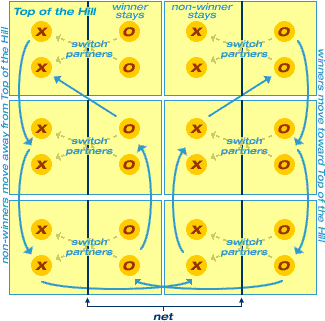|
Top
of The Hill - Outcome
C (10-30)-3
The students begin by choosing partners for a
doubles tournament in badminton. Indicate which one of the courts
is the "Top Of the Hill" court. The game begins by having the teams
determine who gets first serve. There are two parts to each match.
Part one is the question/answer portion and part two is active participation
in the game of badminton.

To begin the match, each team gets to ask their
opponents a maximum of three questions regarding badminton rules.
For each question that the opponents get wrong, the team asking
the questions scores a point. If the opponents get the answer correct,
no one gains a point.
When the game begins, the teams may have obtained
points from the question portion of the match and they start the
game with those points. For example, the score could be three to
one at the beginning of a game, depending on the question portion.
The game continues until a set time or a set number
of points, determined earlier by the instructor. The winning team
then moves to the next court towards the "Top Of The Hill" and the
team that did not win moves to the next court away from the "Top
of the Hill".
Once the team moves to the next court, they must
switch partners with someone across from them before beginning the
next game. This allows students to get to know others in the class
and sets up a climate of tolerance, understanding, and cooperation.
The games continue. The task is to get to the
"Top Of The Hill" and be able to stay there no matter who your partner
may be.

Allow only three questions in total, and let the
team who gets first serve ask the question first. If they stump
the opponents, they go on to ask a second question and so on to
a maximum of three. If they do not stump the opponents, then the
opponents ask the next question. The questioning will go back to
the serving team if the serving team answers correctly. The opponents
will ask the third question if the opponents won that point.
This activity can apply to other games such as
2 on 2 basketball.

These
are clues that you have reached the outcomes ...
Students demonstrate their knowledge of the game by being able to
answer the questions correctly.
Students
demonstrate fair play by making fair calls on boundaries and not
cheating on the rules.
Students
demonstrate cooperation and good sportsmanship in switching partners
for each match without making anyone feel unwanted.
back
to top
|


